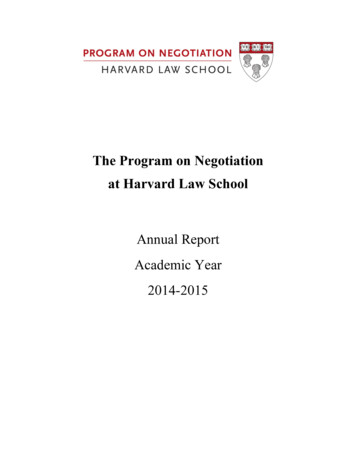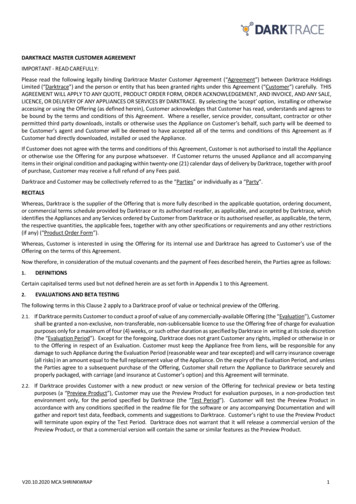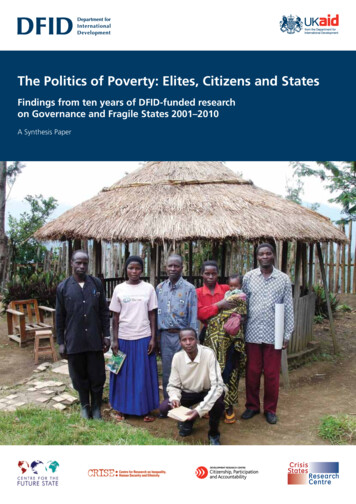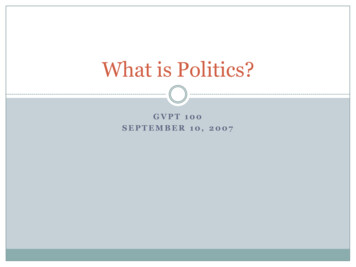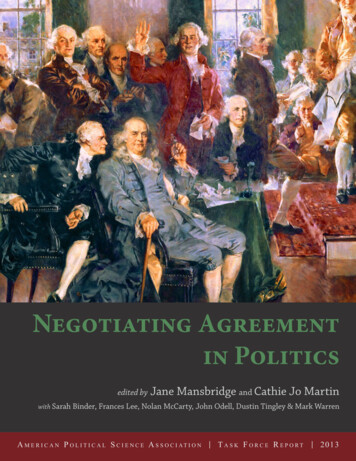
Transcription
Negotiating Agreementin Politicsedited byJane Mansbridge and Cathie Jo Martinwith Sarah Binder, Frances Lee, Nolan McCarty, John Odell, Dustin Tingley & Mark WarrenA m e r i c a n P o l i t i c a l S c i e n c e A ss o c i a t i o n T as k F o r c e R e p o r t 2013
Negotiating Agreement in PoliticsReport of the Task Force onNegotiating Agreement in PoliticsEdited by Jane Mansbridge and Cathie Jo MartinDecember 2013American Political Science Association1527 New Hampshire Avenue, NWWashington, DC 20036-1206Copyright 2013 by the American Political Science Association. All rights reserved.ISBN: 978-1-878147-47-9
Task Force onNegotiating Agreement in PoliticsTask Force MembersJane Mansbridge, Harvard University,APSA President 2012-2013Cathie Jo Martin, Boston UniversityLinda Babcock, Carnegie Mellon UniversityMichael Minta, University of MissouriAndré Bächtiger, University of LucerneRobert Mnookin, Harvard University Law SchoolMax Bazerman, Harvard Business SchoolAndrew Moravcsik, Princeton UniversitySarah Binder, George Washington UniversityKimberly Morgan, George Washington UniversityEmile Bruneau, Massachusetts Institute of TechnologyDaniel Naurin, University of GothenburgMax Cameron, University of British ColumbiaJohn Odell, University of California, Co-ChairAndrea Campbell, Massachusetts Institute of Technology David Rand, Yale UniversityiiSimone Chambers, University of TorontoChristine Reh, University College LondonThomas Edsall, Columbia and New York TimesLaurie Santos, Yale UniversityJohn Ferejohn, Stanford & New York UniversityRebecca Saxe, Massachusetts Institute of TechnologyMorris Fiorina, Stanford UniversityEric Schickler, University of California, BerkeleyRobert Frank, Cornell UniversityMelissa Schwartzberg, Columbia UniversityTorben Iversen, Harvard UniversityJames Sebenius, Harvard UniversityAlan Jacobs, University of British ColumbiaJanice Gross Stein, University of TorontoRobert Keohane, Princeton UniversityCass Sunstein, Harvard University Law SchoolAndrew Kydd, University of WisconsinYael Tamir, Shenkar College of Engineering and DesignGeoffrey Layman, University of Notre DameDennis Thompson, Harvard UniversityJames A. Leach, University of Iowa School of LawDustin Tingley, Harvard University, Co-ChairFrances Lee, University of MarylandSonia Wallace, Rutgers UniversityAshley Leeds, Rice UniversityBarbara Walter, University of California, San DiegoGeorge Lowenstein, Carnegie Mellon UniversityMark E. Warren, University of British ColumbiaJulia Lynch, University of PennsylvaniaMelissa Williams, University of TorontoFen Hampson, Carleton UniversityCornelia Woll, Sciences PoThomas Mann, Brookings InstitutionI. William Zartman, Johns Hopkins UniversityNolan McCarty, Princeton UniversityJonathan Zeitlin, University of AmsterdamAmerican Political Science Association
Table of ContentsTask Force Members. . . . . . . . . . . . . . . . . . . . . . . . . . . . . . . . . . . . . . . . . . . . . . . . . . . . . . .iiAcknowledgements . . . . . . . . . . . . . . . . . . . . . . . . . . . . . . . . . . . . . . . . . . . . . . . . . . . . . . .vExecutive Summary. . . . . . . . . . . . . . . . . . . . . . . . . . . . . . . . . . . . . . . . . . . . . . . . . . . . . . .viIntroduction1. Negotiating Political Agreements. . . . . . . . . . . . . . . . . . . . . . . . . . . . . . . . . . . . . . 1Cathie Jo MartinStalemate in the United States2. Causes and Consequences of Polarization. . . . . . . . . . . . . . . . . . . . . . . . . . . . . . 19Michael Barber and Nolan McCartyWorking group: Andrea Campbell, Thomas Edsall, Morris Fiorina,Geoffrey Layman, James Leach, Frances Lee, Thomas Mann, MichaelMinta, Eric Schickler, and Sophia Wallace3. Making Deals in Congress . . . . . . . . . . . . . . . . . . . . . . . . . . . . . . . . . . . . . . . . . . . . . . 54Sarah Binder and Frances LeeThe Problem: Negotiation Myopia; The Solution: DeliberativeNegotiation4. Negotiation Myopia. . . . . . . . . . . . . . . . . . . . . . . . . . . . . . . . . . . . . . . . . . . . . . . . . . . 73Chase Foster, Jane Mansbridge, and Cathie Jo MartinWorking group: Linda Babcock, Max Bazerman, Emile Bruneau, GeorgeLoewenstein, David Rand, Robert Frank, Robert Mnookin, Laurie Santos,Rebecca Saxe, and Cass SunsteinTask Force on Negotiating Agreement in Politicsiii
Table of Contents5. Deliberative Negotiation. . . . . . . . . . . . . . . . . . . . . . . . . . . . . . . . . . . . . . . . . . . . . . . . 86Mark Warren and Jane MansbridgeWorking group: André Bächtiger, Maxwell A. Cameron, Simone Chambers, JohnFerejohn, Alan Jacobs, Jack Knight, Daniel Naurin, Melissa Schwartzberg, YaelTamir, Dennis Thompson, and Melissa WilliamsInstitutions and Rules of Collective Political Engagement6. Conditions for Successful Negotiation: Lessons from Europe . . . . . . . . . . . 121Cathie Jo MartinWorking group: Andrew Moravcsik, John Ferejohn, Torben Iversen, Alan Jacobs,Julia Lynch, Kimberly Morgan, Christine Reh, Cornelia Woll, and Jonathan Zeitlin7. Negotiating Agreements in International Relations. . . . . . . . . . . . . . . . . . . . . 144John S. Odell and Dustin TingleyWorking group: Fen Osler Hampson, Andrew H. Kydd, Brett Ashley Leeds,James K. Sebenius, Janice Gross Stein, Barbara F. Walter, and I. William ZartmanivAmerican Political Science Association
AcknowledgementsWe are grateful to Kimberly Mealy, Michael Brintnall and Steven Smith at the APSA for theirdedication and help in this project. Chase Foster provided exemplary research assistance,while Bruce Jackan and Juanne Zhao of the Ash Center at the Kennedy School were extremelyhelpful in the early stages of the project. We are grateful to many institutions and theirsupportive staff for making this project possible. We thank the Ash Center for DemocraticGovernance and Innovation at the Harvard Kennedy School for supporting the CognitiveBias Working Group, the US Working Group, and part of the European Working Group;the Centre for the Study of Democratic Institutions at the University of British Columbiafor supporting the Normative Working Group; the Weatherhead Center for InternationalAffairs at Harvard University for supporting the International Relations Working Group;and the APSA for supporting part of the European Working Group as well as a meeting ofrepresentatives of all working groups at the 2013 Midwest Political Science Association annualmeeting. In particular we thank the APSA for publishing this report and Liane Piñero-Klugefor her commitment, effort, and good will in the publication process. As always, Cathie JoMartin thanks her husband and children – Jim, Julian and Jack Milkey – for their love andchoice one-liners about the art of politics.Task Force on Negotiating Agreement in Politicsv
Executive SummaryNegotiating Agreement in PoliticsThe breakdown of political negotiation within Congress today is puzzling in several importantrespects. The United States used to be viewed as a land of broad consensus and pragmatic politicsin which sharp ideological differences were largely absent; yet today politics is dominated byintense party polarization and limited agreement among representatives on policy problemsand solutions. Americans pride themselves on their community spirit, civic engagement, anddynamic society, yet we are handicapped by our national political institutions, which often—butnot always—stifle the popular desire for policy innovation and political reforms. The separationof powers helps to explain why Congress has a difficult time taking action, but many countriesthat have severe institutional hurdles to easy majoritarian rule still produce political negotiationsthat encompass the interests and values of broad majorities.This report explores the problems of political negotiation in the United States, provideslessons from success stories in political negotiation, and offers practical advice for how diverseinterests might overcome their narrow disagreements to negotiate win-win solutions.We suggest that political negotiation is often essential to democratic rule, yet negotiatingis difficult to do. First, the human brain makes mistakes that stymie even good-faith efforts.Second, our own Congress today faces greater structural obstacles to successful negotiation thanat any time in the past century. Members of Congress themselves have identified many of thereforms within Congress that would produce such joint gains. We support those proposals withdata from studies of the Congress, from Europe, from international relations, and from cognitivepsychology.The Human BrainOur analysis throughout this report applies only to “tractable” situations in which both or allparties to a negotiation could gain. We use the term negotiation myopia to describe the inabilityto see these available joint gains. Chapter 4, titled “Negotiation Myopia,” focuses on the two maincognitive mistakes that interfere with the parties seeing and realizing all that they could fromtheir interaction. Drawing from almost a half -century’s worth of scholarship on negotiationand recent work in cognitive psychology, the chapter shows how fixed-pie bias can blind up to60% of participants to the possible gains in a negotiation, and it shows how self-serving bias oftenproduces impasse even when both parties can gain from agreement.viAmerican Political Science Association
Structural Obstacles to Negotiation in the US CongressChapter 2, titled “Causes and Consequences of Polarization,” demonstrates that the parties inCongress are more polarized now than they have been since 1906 (Figure 1). The causes are notlikely to disappear soon, and they include the realignment of the parties since President Johnsonsigned the 1964 Civil Rights Act; the closely matched electoral strength of the two partiessince 1980; and the growing income inequality in the United States combined with the greatlyincreased importance of fundraising in politics. According to recent studies, both redistrictingreforms and open primaries will do relatively little to help. Campaign-finance reform couldprobably reduce polarization, but significant reform in this realm is unlikely in the near future.Figure 1: Polarization in Congress.2.4Polarization.6.81Average Difference on Party Conflict Scale18781894191019261942YearPolarization in House1958197419902006Polarization in SenateFigure 1: Average Distance between Positions across Parties. The y-axis shows the difference in mean positions between the two parties inboth the House of Representatives and the Senate from 1879 to 2011, using the DW-NOMINATE measures. Congress is more polarizednow than it has been in more than 100 years.Institutions and Rules to Overcome Negotiation MyopiaProcedural arrangements for resolving political strife—which we call the rules of collectivepolitical engagement—suppress myopia and augment the potential for deliberative negotiation.These arrangements include a careful incorporation of technical expertise, repeated interactions,penalty defaults, and relative autonomy in private meetings. Some countries incorporatethese arrangements into their political institutions and therefore can rely more extensively oncooperation and compromise in the normal practice of politics. Yet even countries without ongoing institutions that facilitate cooperation may adopt these procedural arrangements andthus produce more successful negotiations (see Chapter 6, titled “Conditions for SuccessfulNegotiation: Lessons from Europe”).Task Force on Negotiating Agreement in Politicsvii
Negotiation in the US CongressIn the United States, we need to negotiate in politics more than, for example, Great Britainbecause the Constitution of the United States, with its separation of powers and checks andbalances, generates many veto points that keep simple majorities from ruling. Because of all ofthese veto points, members of Congress must negotiate at least partial agreement not only withintheir parties but also across party lines within each house, between the two houses, and withthe president. Chapter 3, titled “Making Deals in Congress,” demonstrates how the practicesof repeated interactions across party lines, private spaces for deliberation, and penalty defaultsfacilitate negotiated agreements in Congress. It emphasizes Congress’s capacity to bring intoa negotiation several issues or facets of an issue at the same time so that the parties can tradeitems that are low priority for one but high priority for the other (i.e., “integrative negotiation”).Currently, the parties in Congress are less likely than parties in other advanced industrialcountries to rely in their negotiations on nonpartisan technical expertise.Is Negotiation “Democratic”?Chapter 5, titled “Deliberative Negotiation,” describes how negotiation is as important a toolin democracy as majority rule. It singles out a particular kind of negotiation, deliberativenegotiation, as the kind most likely to produce agreements that encompass the interests andvalues of broad majorities as well as the kind most compatible with democratic ideals. We alsoshow that certain conditions that make deliberative negotiation possible, such as closed-doorarenas for discussion, long incumbencies, and various forms of side-payments, can be compatiblewith democratic ideals.Lessons from International NegotiationChapter 7, titled “Negotiating Agreements in International Relations,” provides lessons fromnegotiations among nations. Some of the many lessons learned are compatible with those learnedfrom studies of Congress and of European nations, including the following: Link issues in which each party gains on matters of high priority and sacrifices onmatters of low priority. Engage in join fact-finding or rely on nonpartisan expertise for the factual basis of thenegotiation. Reveal information to the others on your preferences and the facts that you haveregarding the topic of negotiation. Actively request information from the others ontheir preferences and their knowledge of the facts. Negotiate in confidentiality.ConclusionThe lessons learned from various sources—commercial negotiations; psychology experiments;and studies of Congress, other democracies, and international relations—are remarkablyviiiAmerican Political Science Association
consistent. They show that when polarization and negotiation myopia pose major problems,deliberative negotiation is a good solution. In deliberative negotiation, the parties shareinformation, link issues, and engage in joint problem-solving. Only in that way can they discoverand create possibilities of which they had no idea before beginning the process. Only in that waycan they use their collective intelligence constructively, for the good of citizens of both partiesand for the country. This report explores these possibilities in depth, drawing on research fromall of the major fields in political science.Task Force on Negotiating Agreement in Politicsix
1Negotiating Political AgreementsCathie Jo MartinIntroductionThe recent gridlock in Congress may well be a metaphor for the erosion of cooperation in contemporary political life.1 We often value cooperation at the community level, but our nationalpublic space is dominated by endless bickering and stalemate, and our national politicalinstitutions seem to betray our best intentions. Many other advanced, industrial democraciesdo a better job at locating pragmatic solutions to pressing policy problems through politicalnegotiation, using the very norms of cooperation that we teach to our children and often practicein our communities. These nations manage the tussles and traumas of politics with a level ofgrace, efficiency, and effectiveness that today seems absent from the American political process,and they avoid the extreme deadlock that often paralyzes contemporary American politics.The “high-noon” brinksmanship between our Democrats and Republicans is fundamentally atodds with the quieter mechanisms for policy making in Northern Europe, and our politics ofstalemate sharply contrasts with their politics of cooperation. One wonders, then, why America—one of the most economically and socially vibrant countries in the world—has become relativelyimpotent in the political realm.This report explores the problems of political negotiation, by which we mean the practicein which individuals—usually acting in institutions on behalf of others—make and respond toclaims, arguments, and proposals with the aim of reaching mutually acceptable binding agreements. We begin by considering the particular obstacles to negotiation in the United States andthe ways that Congress currently addresses these obstacles. Drawing from writings in experimental psychology, we identify forms of what we call negotiation myopia—that is, the mistakesmade by the human brain in processing information and calculating collective political interests.We summarize how the institutions and procedural rules of collective political engagement helpto overcome negotiation myopia, and we highlight European and international examples of institutions that create dramatically different incentives for cooperation among political actors, interest groups, and citizens. Finally, we offer suggestions for how policy makers might overcomeinstitutional constraints against negotiating agreement in politics.In great part, the institutional obstacles to political negotiation in the United States are wellknown: a strong separation of powers between the presidency and Congress (with branches oftencontrolled by different parties) and the structure of two-party competition (particularly whenthese parties are polarized and relatively equally matched) produce few incentives for political1The author wishes to thank Jane Mansbridge, Frances Lee, Sarah Binder, Dino Chistensen and Doug Kriner for invaluablecomments on this chapter.Task Force on Negotiating Agreement in Politics1
cooperation between the warring sides. Politicians in countries with multiple major parties mustpractice cross-party cooperation to gain and hold power, and the governments of those countriesoften have close linkages between the executive prime ministers and their legislative parliaments.Our two major parties in the United States have no such incentives. Win or lose is the name ofthe game, and constant conflict, changes in government, and frequent policy reversals make foran unstable policy and business climate.Our institutions for organizing private interests do little to further successful political outcomes. For example, American firms are adept at demanding narrow regulatory concessions thatpertain to their own industry, and Congress is bombarded with demands from every “nook andcranny” of the business community. Yet, employers and unions have weak associations to helpthem meet collective political goals; consequently, they have difficulty expressing collective interests. They do not trust government, but they also cannot trust their collective selves.It would be naive to think that all conflicts may be negotiated, and this is particularlytrue for the current American Congress (see Chapters 2 and 3). Legislators may derive greaterbenefits from blocking deals than from making a good-faith effort for mutual accommodation.In their reluctance to negotiate a mutually acceptable compromise, they may be driven by theirwell-healed funders, by electoral and partisan priorities, or by deep ideological divisions. Evenpolitical agreement does not ensure democratic and/or just solutions to policy problems: dealsmay benefit those at the negotiation table but may adversely affect those whose interests are notrepresented (e.g., the future generations, the marginally employed, and the nonvoters). When reformers confront parties that prioritize electoral gain above substantive solutions to economicand social problems, and deep-seated ideological divisions result in stalemate and blindness tothe fortunes of future generations, then political struggle rather than negotiation may well be thebetter recourse for altering the status quo.Yet, despite the institutional odds against it, political negotiation sometimes works in theUnited States, and this report analyzes how these episodes of success may occur. These unexpected successes in political negotiation often happen when participants adopt the rules of collective political engagement that routinely enable higher levels of cooperation in other advanceddemocracies. For example, procedural arrangements that incorporate a formal role for nonpartisan, technical expertise in policy deliberations in advance of specific legislative proposals mayfacilitate a collective “meeting of the minds.” Repeated interactions among participants establishinformal punishments for deception and bloated claims while nurturing norms of trustworthybehavior. Dire consequences of inaction help to prevent stonewalling behavior. Allowing negotiations to take place in private settings encourages pondering rather than posturing.We argue that adopting many of these rules of engagement may facilitate deliberativenegotiation, in which participants search for fair compromises and often recognize the positivesum possibilities that are otherwise frequently overwhelmed by zero-sum conflicts. Of course,deliberative negotiation is possible only in situations in which some potential common groundor zone of possible agreement exists and participants have a genuine desire to achieve a deal. Butpractices of deliberative negotiation have been central to American democracy since the construction of our nation. We think that it is time to return to the basics. Thus, this task force reviews our institutional disincentives for cooperation and rewards for conflict and also suggestsbest practices in the art of collective politics.2American Political Science Association
Negotiation MyopiaIndividuals often fail to agree to resolutions that would leave everyone better off in part becausethe human brain falls prey to negotiation myopia, a constellation of cognitive, emotional, andstrategic mistakes that stand in the way of achieving agreement and mutual gains. Two majorforms of cognitive myopia—fixed-pie bias and self-serving bias—impede successful negotiation. Asuccessful negotiation may either simply settle on some point in the zone of possible agreementamong the parties or, more expansively, produce an agreement that captures all of the “jointgains” that can be discovered or created in the situation. Fixed-pie bias prevents participantsfrom seeing and exploiting all possible joint gains and sometimes prevents any agreement at all.Self-serving bias makes the parties to the negotiation overestimate their likelihood of winning,thereby standing in the way of actually making an agreement. Emotions also may block successfulnegotiation; the emotional barrier of anger particularly interferes with the production of collectiveagreement. In addition, myopia relevant to our sense of timing—such as uncertainty anddifficulties considering second- and third-order effects—may distort or diminish our incentivesfor long-term thinking because few want to make short-term investments in exchange for risky,long-term rewards (Jacobs 2011, 52). Global warming is a classic example of time myopia: citizensare asked to make changes in their lives and automobile manufacturers are called on to invest inemissions-reducing technology that will have an impact on climate change 20 years hence.Strategic hardball tactics also can stand in the way of concluding successful negotiations.Such tactics particularly come into play when parties aim at short-term gains rather than longterm relationships. In any negotiation, participants may rationally reject a resolution that benefitsthem in the short run if they believe that forgoing immediate gains will set them up for an evenbigger future victory. This is no less true of Congress. As the causes and consequences of polarization in the United States are explained in Chapter 2, such tactics result in the most benefitswhen the parties in Congress are almost equally matched: if the minority party can possibly gainthe majority in the next Congress, it has strong political motivations to prevent policy successesthat will give electoral advantages to the majority party. At a significant point in the Clintonera negotiation over health reform, for example, Republican strategists determined that theirbest chances for a surge in public support at the next election were in simply killing the Clintonhealth-reform bill. Thus, they urged legislators to reject any alternative bipartisan measure. Thetactic was highly successful in the short run. Along with many other developments, however, ithelped poison future relationships, undermining the potential for long-run joint gains.Deliberative NegotiationUnder certain conditions, negotiation myopia may be overcome with institutional rules of collective engagement that enable deliberative negotiation, by allowing participants to rise above theirinternecine squabbles and to focus on value-creating accords. By deliberative negotiation, wemean negotiation characterized by mutual justification, respect, and the search for fair terms ofinteraction and outcomes. This kind of negotiation may entail pure deliberation, in which the parties develop a collective understanding of the problems confronting them and seek to articulatea common good. It may also include fully integrative negotiation, in which the parties find a creative way to approach the problem that provides both with what they actually want and neitherparty loses.Task Force on Negotiating Agreement in Politics3
More often, deliberative negotiation includes what we call partially integrative negotiation,in which the parties find or bring in a host of issues on which they place different priorities sothat they can trade on those items that are high priority for one and low priority for the other. AsBinder and Lee point out in Chapter 3 on deal making in Congress, this kind of negotiation is farmore possible in Congress than in the commercial or legal world because Congress will alwaysbe looking to resolve numerous issues at any one time. Linking those issues in a productive wayis thus easier than when complementary issues must be sought out and actively brought into thediscussion. Finally, deliberative negotiation includes the search for fair compromises. As withthe search for integrative solutions, such a search is best conducted by members who know andrespect one another and who appreciate as well the different and often conflicting interests thateach represents.Both integrative and partially integrative negotiations differ from pure-bargaining situations in which opponents strive to obtain the maximum number of concessions from one another. In pure bargains, the parties make distributive, zero-sum exchanges with particularisticpayoffs without striving for a fair compromise.The issues of justice and the long term are also more relevant in deliberative negotiation.In a just deliberative negotiation, the parties at the table strive to incorporate as much as possiblethe interests of those not represented, including future generations. From a practical perspective,deliberative negotiations are also more likely to consider the longer-term ramifications of theagreements reached.Rules of Collective Engagement and Conditions for DeliberativeNegotiationThis section considers the conditions under which negotiation myopia may be overcome and“pie-expanding” deals with joint gains may be obtained. We suggest that bargaining processes—whether in the sphere of private conflict resolution or national policy making—are structured byrules of collective engagement. These “rules of the game” stipulate specific procedural arrangements that set the terms of negotiation and define acceptable sources of information, patterns ofinteraction among participants, consequences for inaction, and autonomy of the bargaining partners. Choices of these specific procedural arrangements influence individuals’ conceptualizationof problems, their emotions about cooperation, and their incentives to take action. When a zoneof potential agreement exists, the adoption of specific rules for collective engagement may overcome the various forms of negotiation myopia—and even shape the conditions for integrativenegotiation.First, participants must agree to acceptable sources of information. In some cases, thevarious sides rely on their own partisan facts; however, in other cases, the negotiation settingbuilds in an explicit role for nonpartisan third parties or technical expertise. These externalexperts may help participants to overcome the forms of myopia related to perspective takingand incomplete information, to mitigate self-serving biases in the perception of facts, to fostera shared understanding of policy problems in more neutral terms, to build shared conceptionsof justice, to diminish ideological left-right cleavages, and to enable creative “cognitive leaps.”Countries have different rules about acceptable sources of information relevant to national4American Political Science Association
political accords: these characteristic “knowledge regimes” and modes of discourse shape theirproduction of policy ideas (Blyth 2002; Campbell and Pedersen 2014; Schmidt 2002). Somenations and international governing bodies use fact-finding bodies, peer review, and performancebenchmarking against agreed indicators; these tools can help to define problems and solutions inrelatively neutral, mutually acceptable terms. Nonpartisan fact-fin
Negotiating Agreement in Politics. Negotiating Agreement in Politics Report of the Task Force on Negotiating Agreement in Politics Edited by Jane Mansbridge and Cathie Jo Martin December 2013 American Political Science A


